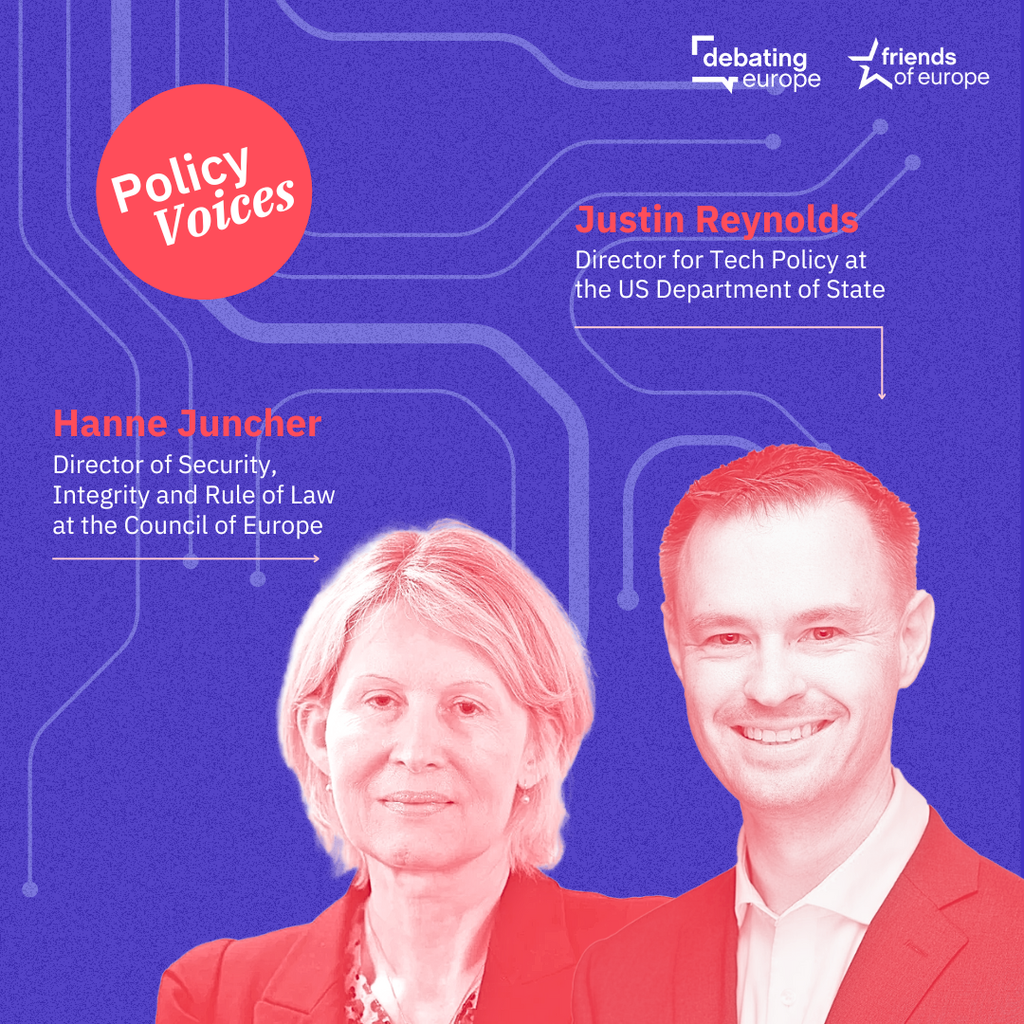A European agenda for space: resilience, security and sovereignty
Past event In person

- Area of Expertise
- Digital & Data Governance
Digital & Data Governance

Despite having contributed its fair share of breakthroughs, Europe seems unable to take a leading role in the digital economy. Alan Turing in the UK and Hungarian-born John von Neumann contributed to the theoretical foundations of computing, and Germany’s Konrad Zuse built the first modern computer. The World Wide Web was invented by another Briton, Tim Berners-Lee, while Linux, which powers the majority of machines driving the Internet, was created by a Finn. The MP3 digital music format that makes iTunes possible was invented in Germany and Skype was invented by a Swede and a Dane.
In short, although Europeans publish their fair share of papers in scientific journals dealing with computer science and information technology, all the major companies that shape the Internet today – Google, Facebook, Amazon, Apple, Microsoft, IBM, Oracle etc. – are American. Germany’s SAP is the exception that proves the rule.
The platforms of the “sharing economy” that is now emerging – eBay, Paypal, Uber and Airbnb – are American too. Yes, it is an American company they helps a German in Poland find a ride in a taxi that is not a taxi. What are we Europeans doing wrong?
In Europe, it’s as if everything is prohibited if not explicitly allowed, with the digital revolution happening much faster than legislators are capable of removing barriers
Europe’s track record on policymaking for the digital revolution tells a mixed story. Twenty years ago, the then German Commissioner for industry, Martin Bangemann produced a report that rang alarm bells. Digital polices have since then been prominently represented in initiatives like the Lisbon Strategy and the Digital Agenda, buttressed by former Spanish premier Felipe Gonzalez’s Reflection Group on the Future of Europe and currently by the Europe 2020 strategy.
In spite of all these, Europe still only a follower in the area of digital and communications technologies. It had a moment of glory with the GSM mobile standard, and temporarily produced global industrial champions like Nokia and Ericsson, but as soon as mobile technology was digitised and phones became nothing less or more than devices to connect to the Internet, it was the Americans who took over on software and Asians (with the exception of Apple) who dominated hardware.
Back in those days of the GSM and early mobile telephones, national strategies, standards and regulations were a help. Now, with the Internet, they aren’t. When the European Commission proudly reduced roaming charges for voice calls and SMSs, they did so just as talking and texting were becoming obsolete. It made tourists happy, but did nothing to contribute to the emerging app industry. Data roaming – using the Internet on smartphones in another EU country – remains prohibitively expensive. It’s a good example of how European legislators fight yesterday’s wars.
European-level policymaking has two problems. First, it has been unable to get ahead of the curve by making the EU’s legal and economic infrastructure ready and welcoming for future technologies, and secondly there’s that famous tendency to over-regulate.
In Europe, it’s as if everything is prohibited if not explicitly allowed, with the digital revolution happening much faster than legislators are capable of removing barriers. The American approach looks different in that everything is allowed unless it’s expressly prohibited.
Smartphone apps that match people who drive with people who want to be driven are threatening to disrupt the entirely non-digital business of taxicabs. They are also globalising the hitherto very local services of urban transport. The platforms to do this around the world have been created by two competing U.S. companies – Lyft and Uber. This paradigm is called by some the sharing economy, by others platforms capitalism. After all, these services are not free and Uber is a very capitalistic company now worth an estimated $50bn.
The current copyright and patent regimes reward existing innovators, but excessive protection of intellectual property makes entry for innovative newcomers difficult
The point is that such platforms are created without government intervention, and that’s an entirely new paradigm of doing business. Throughout the middle ages, for example, cities created the platforms where buyers and sellers could meet, and governments established the rules and punished cheats. They were called markets, and made many cities across Europe rich. Now, for instance, eBay is a market governed by a company. Instead of regulating what buyers and sellers can do, the platform maintains information about the reputation of buyers and sellers that has been provided by the users of the platform, not by some authority. Increasingly, the platforms for all kinds of transactions will be created by companies, but they will also need a platform to operate on.
In the context of the Internet’s platform economy, a state becomes a platform. On the Internet, geographic location is insignificant. Businesses are free to choose the country that will host their global operations. The European problem is that the EU and most of its member states are not a good platform for such companies, nor for meetings between people with knowledge and ideas and people with money to invest and make innovations a global success.
Europe’s failure is apparent. The most recent EU document with some promise is the Digital Single market initiative by the European Commission, published in May of this year. It offers another good starting point for modernising Europe, but it isn’t the first such document, and it may suffer the same fate as its many predecessors, all of which failed because their execution lacked any sense of urgency. As in a medical emergency, what’s needed in Europe is a political triage of digital policy measures.
First, there must be a dismantling of the barriers to cross-border traffic in Europe of digital content and services. This should have been done long ago with the full weight of the European institutions behind it. If the EU was able to introduce a single currency it should have been able to make itself a single geographical area for intellectual property rights, including music, videos and patents. This is much easier, with far smaller side effects, than a currency union. Other single market measures such as cancelling roaming or obstacles for the transportation of material goods are important too.
Second, there are the measures needed to make Europe a friendlier location for commercialising innovation. The current copyright and patent regimes reward existing innovators, but excessive protection of intellectual property makes entry for innovative newcomers difficult. And opportunities for innovation given to the masses by the Internet are of a magnitude bigger than in the material world of manufactured goods. These things take time, of course, and require the EU to secure fresh global agreements in the context of WIPO and other global fora.
Overhauling legislation in Europe is needed so that the digital economy is not forced to mould itself into traditional ways of doing things. Legislation must be rewritten from the current prescriptive approach, laying down how things should be done, to a descriptive approach, setting out the goals of regulation without defining too closely the means of how to do it. In that way, the digital world can freely invent the means by which it will satisfy goals.
These digital structural reforms have little to do with digital itself. The aim must be to make European countries compatible with future developments on the Internet. The necessary reforms include overhauling the labour markets, social security, education, security, legal systems and so on. Much can be done in individual member states once motivated by a common digital market.
Overhauling legislation in Europe is needed so that the digital economy is not forced to mould itself into traditional ways of doing thing
Third, there are ideas in the EU’s digital single market document expressing an ambition that Europe should use regulation and the power of governments to get more competitive in digital: for example, by imposing regulations that would make it difficult for foreign companies to compete. This may be dressed up as concern for privacy and workers’ rights, and while some of these concerns are legitimate, it would be wrong to use them as a pretext to help the European digital industry. Protectionism is potentially very dangerous, for if an industry is offered an opportunity to develop, say, the “European Cloud”, it would be doing something that has already been invented, and the competition elsewhere would meanwhile be working on the next generation of technology to replace the cloud.
If we in Europe feel so strongly about privacy, this concern should create a market of apps and services that would offer privacy. If it is a good idea, it will soon be a global success. Yet some EU countries are taking just the opposite direction, and would seek legislation to deprive their citizens from using encryption technology on the grounds that privacy tools would help terrorism.
Bill Kennard, the former U.S. ambassador to the EU, pointed out not long ago that the economic success of countries will depend on how fully they embrace technology. In Europe, a selection of measures is therefore needed. A digital single market needs to be put in place urgently so that all other measures will get the help of its invisible hand. Then, a structural overhaul of European society at large is needed if we are to become digital-revolution proof. Finally, the idea that Europe can become competitive in the digital world through legal actions and by making life difficult for foreign businesses is dangerous, and should be abandoned.
Past event In person

Next event In person & livestreamed

Past event Online

Past event In person





Stay informed
We use cookies and similar technologies to adjust your preferences, analyze traffic and measure the effectiveness of our campaigns. Learn more about our privacy policy.